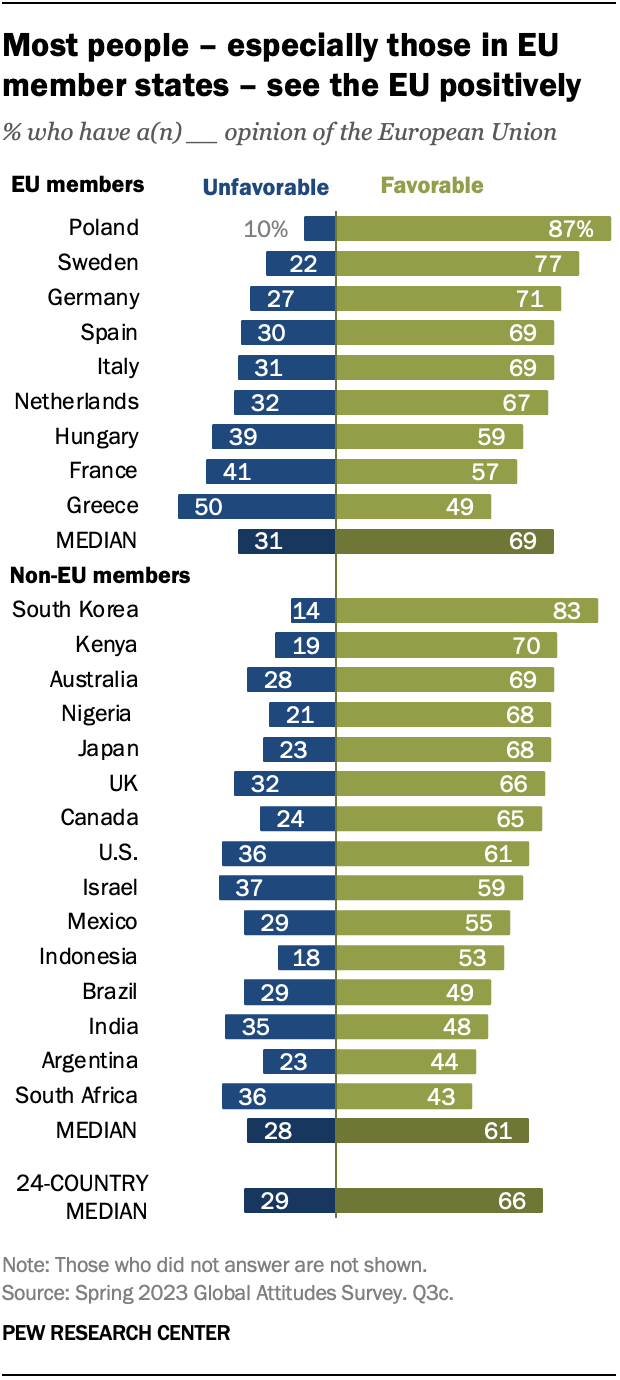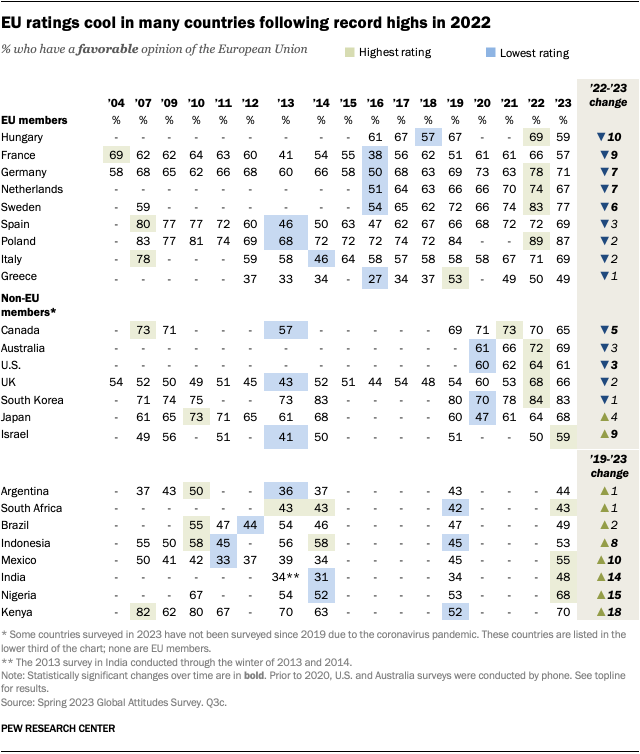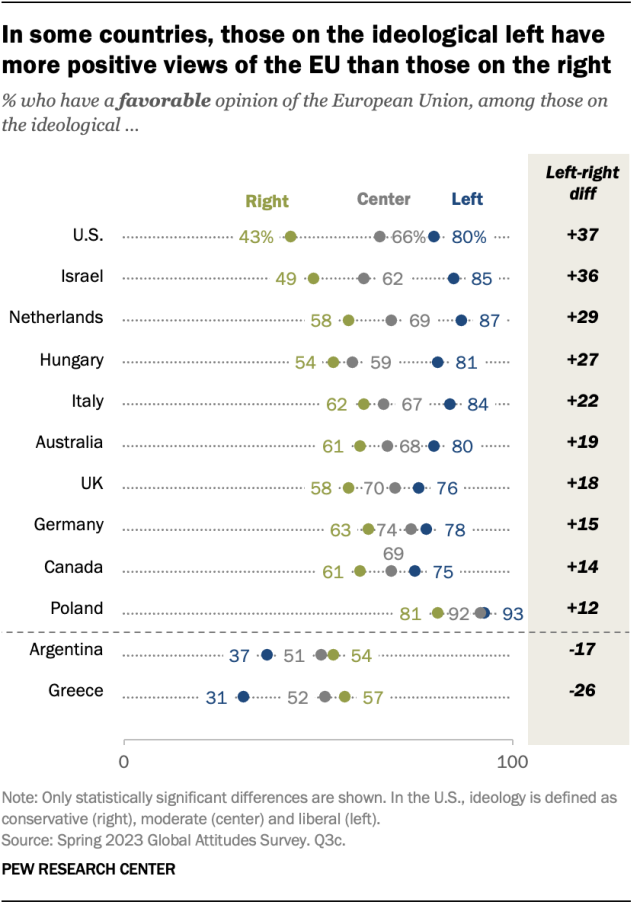
The European Union receives largely favorable marks globally, according to a Pew Research Center survey conducted this spring. Across the 24 countries surveyed, a median of 66% give the EU a positive rating, while 29% give it a negative rating.
This Pew Research Center analysis explores views of the European Union in 24 countries in North America, Europe, the Middle East, the Asia-Pacific region, sub-Saharan Africa, and Latin America . EU favorability is examined through long-term trend data and demographic analysis. Because of corona virus pandemicThis is the first year since 2019 that the Center’s Global Attitudes Survey has included countries in Africa and Latin America.
For non-U.S. data, this analysis relies on nationally representative surveys of 27,285 adults conducted from February 20 to May 22, 2023. All surveys were conducted by telephone among adults in Canada , France, Germany, Greece, Italy, Japan, the Netherlands, South Korea, Spain, Sweden and the United Kingdom. The surveys were conducted face-to-face in Argentina, Brazil, Hungary, India, Indonesia, Israel, Kenya, Mexico, Nigeria, Poland and South Africa. In Australia, we used a mixed-mode probability-based online panel.
In the United States, we surveyed 3,576 adults from March 20-26, 2023. All those who participated in this survey are members of the Center’s American Trends Panel (ATP), an online survey panel recruited by the through a random national sampling of people. residential addresses. This way, almost every American adult has a chance of being selected. The survey is weighted to be representative of the U.S. adult population by gender, race, ethnicity, partisan affiliation, education and other categories. Learn more about the ATP methodology.
here is question used for analysisas well as the answers and the survey methodology.

Across the nine EU member states surveyed, a median of 69% have a favorable view of the organization, while 31% have an unfavorable view. Majorities in all but one country – Greece – express a favorable opinion. Opinions are particularly positive in Poland, where almost nine in ten respondents (87%) say they have a positive opinion of the EU.
Outside the bloc of member states, opinions on the EU are somewhat similar, with a median of 61% across 15 countries giving a positive rating. In every country, a greater proportion of people have a positive view of the EU than a negative view. Opinions are most favorable in South Korea, where around eight in ten respondents (83%) express a positive opinion towards the EU. And in the United States, about six in ten people (61%) have a favorable opinion of the organization.
In some non-member countries, a significant part of the population does not express an opinion on the EU. For example, two in ten or more people in Argentina, Brazil, Indonesia and South Africa do not share this opinion.
Favorable views on the EU over time
Among member countries, favorable opinions of the EU have fallen in some places since 2022. This is particularly evident in Hungary, where favorable opinions have fallen by 10 percentage points, approaching a record low historic after reaching a record level in 2022.
Hungary has clashed with the EU over the past year, particularly over sending EU military aid to Ukraine and impose sanctions against Russia. Overall, Hungarians prefer to reduce economic sanctions against Russiaand about three-quarters say maintain access to Russian oil and gas is more important than being tough on Russia on Ukraine, according to recent Center surveys.

In other countries, the decline in favorable opinion reflects a return to levels before Russia’s invasion of Ukraine in 2022. In the Netherlands, for example, the share of people with a favorable opinion towards the EU increased from 70% in 2021 to 74%. % in 2022, to 67% in 2023. Opinions have also become a little less positive since 2022 in France (-9 points), Germany (-7) and Sweden (-6).
Among non-member countries, opinion on the EU has also become less favorable in Canada and the United States. However, they became more favorable in some countries, including Israel, where scores reached a record high of 59%, up 9 percentage points since last year. (The 2023 survey was conducted before the last war between Israel and Hamas.)
In some countries where the Center has not been able to investigate since 2019 due to the coronavirus pandemic, opinions have become significantly more positive since we last asked this question. In India, Kenya, Mexico and Nigeria, shares with a favorable opinion of the EU have increased by 10 percentage points or more since 2019. This increase could be similar to that observed the one we observed in our 2022 surveydeployed at the start of the Russian military invasion of Ukraine.
How opinions on the EU vary within countries
As observed in previous years, in both member and non-member countries, people who are on the left ideologically often express a more favorable view of the EU than those on the right. This difference is most evident in the United States, where liberals are 37 percentage points more likely than their conservative counterparts to have a positive view of the EU (80% versus 43%).
A similar trend exists in Israel, where there is a 36-point gap between those on the left and those on the right (85% versus 49% in favor). Eight other countries also have double-digit ideological differences on this issue.

Another trend that persists over time is that, in some European countries, supporters of right-wing populist parties are less likely to have a favorable view of the EU. For example, in the Netherlands, those who support the right-wing Party for Freedom (PVV) are 22 points lower than those who do not support the PVV in perceiving the EU positively. Similar trends exist in France, Germany, Italy, Poland, Sweden and the United Kingdom.
And in Hungary, supporters of the right-wing Fidesz party, led by Prime Minister Viktor Orban, are 25 points fewer than those who do not support Fidesz in having a favorable view of the EU. However, those who support Jobbik, another right-wing party, are more are more likely to have a positive view of the EU than non-partisans. (For more information on how we classify populist parties, read the Annex to our report on Hungarian and Polish views on Russia and the United States)
Views on the EU also vary by age in some countries. In ten countries, adults aged 18 to 39 are more likely than those aged 40 and over to have a favorable opinion of the EU. For example, in the UK, 81% of those under 40 express a positive opinion of the organization, while 60% of those aged 40 and over say the same. In Italy, there is a 15-point gap between those under 40 and their older counterparts (79% versus 64% in favor) on this question.
Note: This is an update to an article originally published on October 13, 2022. Here is the question used for analysisas well as the answers and the survey methodology.



